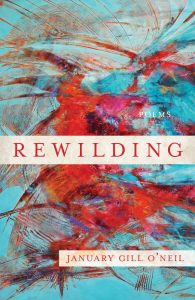Reviewed by Christine Salvatore
We know memory is a passport that never expires.
—from “The Hurting Time”
What if the day before your wedding the world imploded? What if years later, that marriage unraveled on an ordinary day? Such dichotomies and contradictions make up the heart of January Gill O’Neil’s third book of poetry, Rewilding. Even the title speaks of something against our human nature; is it even in us to make something wild again? Poems that move from a life contained, orderly, and domesticated to the wish for freedom make us believe that rewilding can be a part of personal transformation.
O’Neil has two other books of poetry, Misery Islands and Underlife, both published by CavanKerry Press. Broken into four sections, O’Neil’s third book begins with a marriage ending and moves toward what it means to rebuild a life. Along the way the poems closely examine memories, parenthood, race, and being a woman alone for the first time in a long time.
The first section repeats images of ash and bone, fear and unfulfilled wishes. From the devastation of 9/11 to a household fire, O’Neil gracefully invokes images to suggest danger is everywhere. In “Kitchen Fire,” the imagery encapsulates the fears of a mother trying to pick up the pieces and fill in the gaps of the once whole family.
Even now
when I feel most safe,
while the children sleep
and I have no more names
to call myself, I look up at the ceiling
to find a single dark silk string dangling,
thick as my daughter’s hair. I close my eyes
and see the terrible billowing (12).
With honesty and clarity, O’Neill makes it clear that children need protecting from inside and from what threatens without. The second section of the book focuses on a daughter and son, finding their own way as they grow up. They act as a beacon in the cave of loneliness for a woman surrounded by issues of race, sex, love, and loss. As the speaker searches for hope in her new circumstances, she grapples with dating, what to do with herself when the children are absent, and how to be strong enough for everyone.
At the center of the second section, the images in “Hoodie” are familiar but distinct. The poem begins with “A gray hoodie will not protect my son / from rain, from New England cold” and surges on to reveal the fears of a mother for her son in a world full of dangerous assumptions. The final lines evoke the long history of racism in this country, from the connotations of young black men in hoodies to the mention of “safe passage” for a son of whom the mother wonders “who could mistake him / for anything but good?” (28) getting to the heart of our powerlessness to always protect the ones we love.
Later in the book, in “On Being Told I Look Like FLOTUS, New Year’s Eve Party 2014,” O’Neill shows us how to go on, even when it seems nothing changes.
[S]he knows we wear our history in our darkness, in our patience.
A compliment is a complement—this I know, just as the clock
will always strike midnight and history repeats. This is how
I can wake up the next morning and love the world again (53).
In this way O’Neill’s poems create an eddy of personal and political themes that illustrate how the two cannot be separated, that to navigate in our current climate means that even when we have our feet planted firmly on the ground, outside forces threaten to blow our lives sideways. One of my favorite poems in the book, “Sober,” says it best, how with chaos all around us, we sometimes get lost.
How easy it is to get caught up
in destruction, how hard it is
to rebuild
back from obliteration—
not from one massive implosion
or the forged steel of a wrecking ball,
but drawing the earth backwards piece by piece…(48)
January Gill O’Neill’s poems answer these questions and more, suggest that there is always a reason to get up in the morning, and that life well-lived is also closely examined. She is a necessary poet for our times, and a voice that each of us needs to hear.
Rewilding by January Gill O’Neil
CavanKerry Press Ltd., 2018, $16 [paper],
ISBN 9781933880686
Christine E. Salvatore received her MFA from The University of New Orleans. She currently teaches literature and writing at Stockton University, in the MFA Program at Rosemont College, and at a public high school in South Jersey. She is a Geraldine R. Dodge Poet and a regular faculty member for Murphy Writing of Stockton University. Her poetry has recently appeared or will appear in Diode, The Turnip Truck[s], The Fem, The Literary Review, The Cortland Review, Mead Journal, as well as others. More information can be found at www.christinesalvatore.com.


